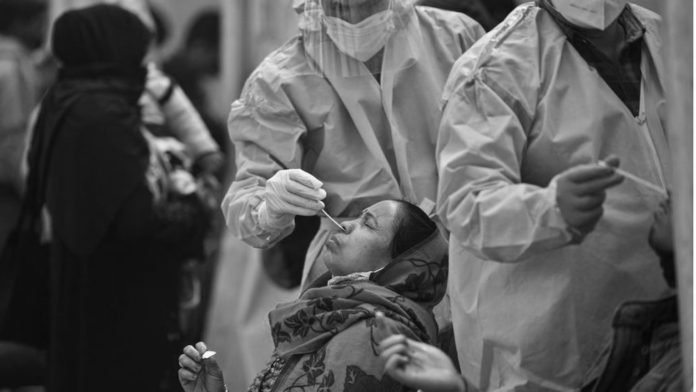India reported 67,084 new Covid-19 cases and 1,241 related deaths in the last 24 hours ending 8 am, Thursday. The active caseload in the country dipped to 7,90,789, from Wednesday’s 8.92 lakh. The daily positivity rate also saw a slight decrease from 4.54% to 4.44% on Thursday.
Health Ministry on Thursday said the overall Covid-19 situation in the country was very optimistic, it cautioned the people against lowering their guard as some states including Kerala, Mizoram and Himachal Pradesh are still reporting a large number of infections. Addressing a briefing, Union Health Ministry Joint Secretary Luv Aggarwal said four states — Kerala, Maharashtra, Tamil Nadu, and Karnataka — have more than 50,000 active cases of Covid-19, while 11 states have active cases between 10,000 and 50,000. Further stating that the the rate of infection spread has come down significantly, Aggarwal said the daily positivity rate of 20.75 per cent recorded on January 24 has now decreased to 4.44 per cent.
Issuing new guidelines for international travellers, the Ministry of Health Thursday scrapped the mandatory seven-day home quarantine. The new guidelines, which come into effect from February 14, require passengers to self-monitor their health for 14 days after arrival and isolate in case they develop symptoms of Covid-19. All passengers will undergo thermal screening on arrival and be isolated at a medical facility if found symptomatic. If they test positive, their contacts will be identified as per protocol. The ‘at-risk’ tag for countries has also been removed. Moreover, passengers from 82 countries are allowed to upload a certificate of full vaccination instead of a negative RT-PCR report obtained 72 hours prior to boarding. These countries include those which have an agreement with India on mutual recognition of vaccination certificates of nationally recognised or WHO recognised vaccines or those which provide quarantine-free entry to Indians.
The Centre on Thursday said Rs 6.15 crore has been approved as financial assistance to families of 123 journalists who died due to the Covid-19 pandemic.
Replying to supplementary questions in the Rajya Sabha, Minister of State for Information and Broadcasting L Murugan also said it was the responsibility of the state governments to take appropriate action against online harassment of women journalists.
On the number of journalists who died during the pandemic, he said, “We are very much concerned about the journalists’ welfare. During the pandemic, we conducted a special drive for journalists. Those who lost lives, we want to support their families.”
“We received 123 journalists’ proposals. All 123 proposals are accepted and we released Rs 6.15 crore amount to the concerned families.”
More about Omicron
The Omicron variant has been called a variant of concern by WHO based on studies that shows it has several mutations.
Still a lot of research is underway to evaluate its transmissibility, severity and reinfection risk.
The Omicron variant has been detected in several regions of the world. WHO reports that the likelihood of the Omicron variant spreading further globally is high.
It is not currently known if the Omicron variant is more or less severe than other strains of COVID-19, including Delta. Studies are ongoing and this information will be updated as it becomes available.
It is not yet clear whether Omicron can spread more easily from person to person compared to other variants, such as Delta.
However, being vaccinated and taking precautions such as avoiding crowded spaces, keeping your distance from others and wearing a mask are critical in helping to prevent the spread of COVID-19, and we know these actions have been effective against other variants.
Researchers are looking into any potential impact the Omicron variant has on the effectiveness of COVID-19 vaccines. Although information is still limited, WHO believes it is a reasonable assumption that the currently available vaccines offer some protection against severe disease and death.
It is also important to be vaccinated to protect against the other widely circulating variants, such as the Delta one. When it’s your turn, make sure to get vaccinated. If your vaccination involves two doses, it’s important to receive both in order to have the maximum protection.
According to WHO, early evidence suggests that people who have previously had COVID-19 could be reinfected more easily with Omicron, in comparison to other variants of concern. Information is still limited though and we will share updates as it becomes available.
Source: UNICEFRead more Health News
Latest update Omicron

